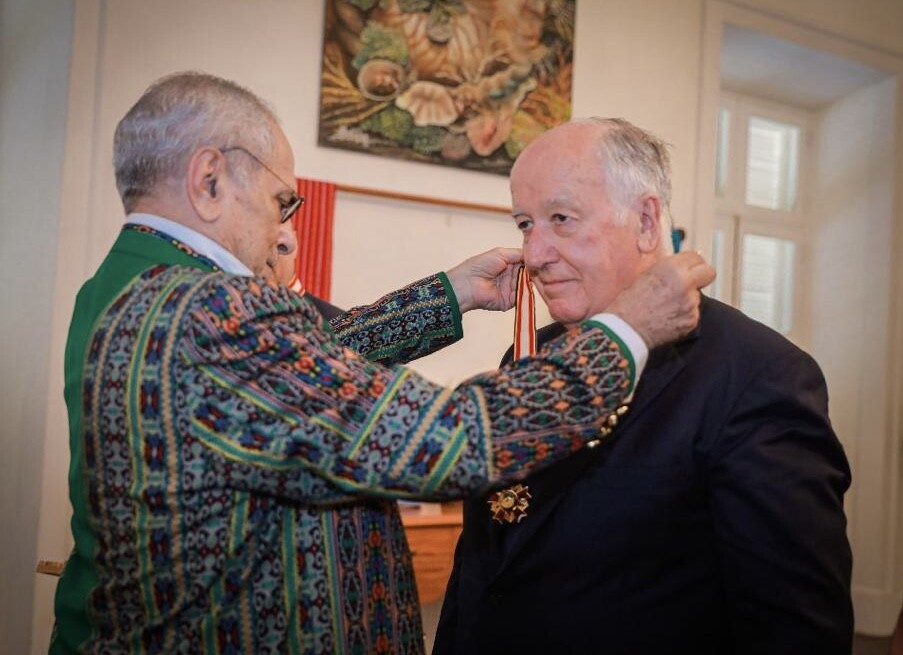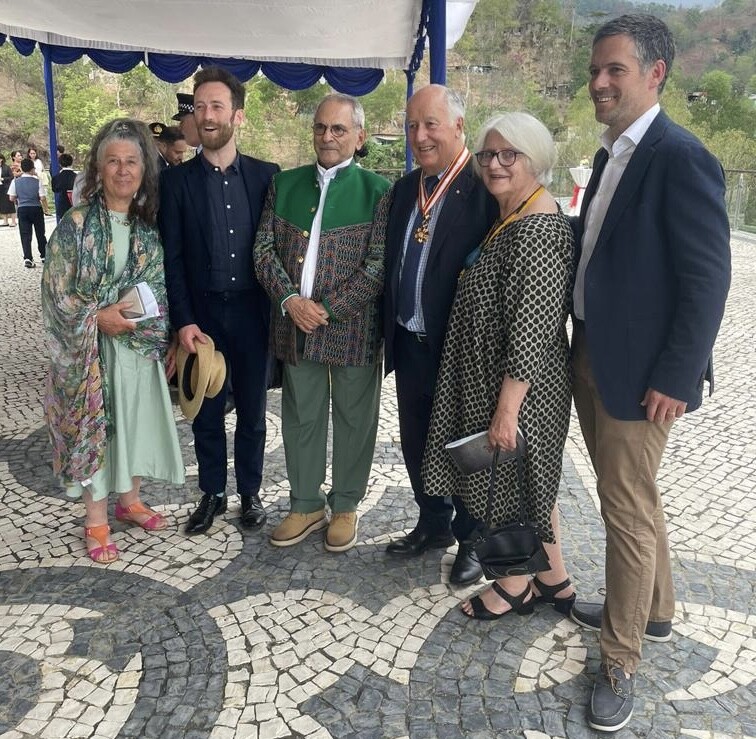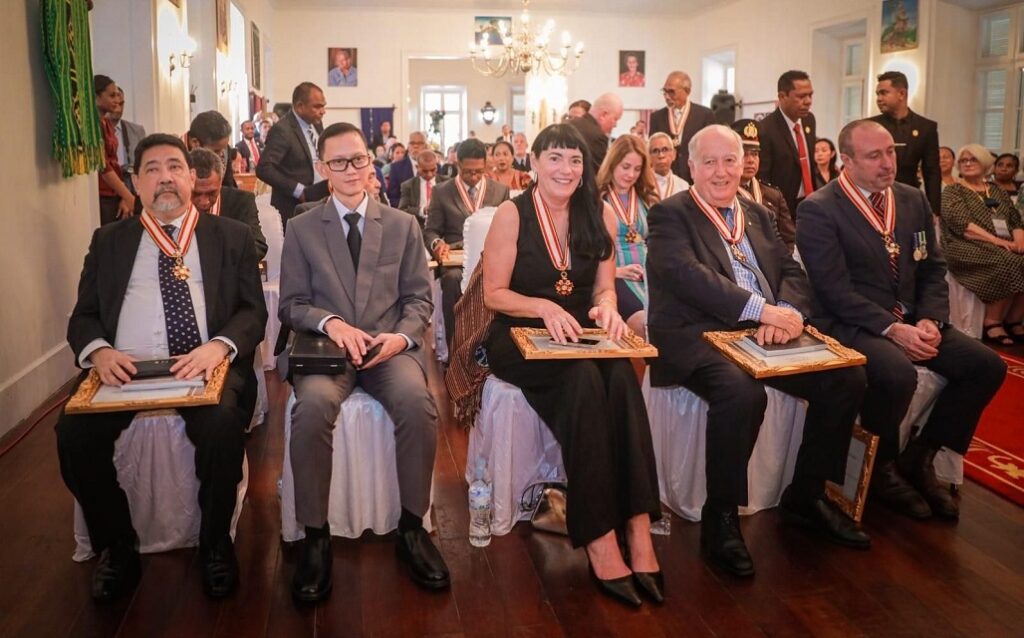Beyond the Medal: The Deeper Meaning of the Order of Timor-Leste

In December 2023, CACCI President Peter McMullin had the privilege of receiving the Order of Timor-Leste. The ceremony was presided over by Nobel Peace Prize Laureate, the current President of Timor-Leste and his long-term friend Dr Jose Ramos-Horta.
The magnitude of the occasion appeared surreal as he reflected on the journey of his life, the decisions he has made, and the people who have supported him.
At the moment he realized he was bleessed by having his family alongside, his wife Ruth, sister Nani and his children; Charlie, his eldest who has 2 beautiful children, Ben his youngest with his partner Fleur. There in spirit, his middle boy Paddy and his partner Maddy.
That family moment let him to reflect on the kind of world the next generation like his son’s and their children will inherit. The world is changing, and Peter wondered what challenges and triumphs lay ahead for them.
Here’s what he thought about.
Complexity is solved through collaboration.
All the greatest innovations in the world have come from a team of people collectively working together. Whether it’s the internet, email, or cars and planes, these inventions would not be possible without having a team helping solve the hardest challenges of our time.
Climate change and sustainability are no different.
Addressing climate change requires a multi-faceted approach, engaging experts, policymakers, businesses, communities, and individuals. It’s a challenge that spans geographic and political boundaries, demanding a global response.
Just as a single part of an engine can’t make a car move, a single effort or idea can’t solve climate change. It requires a coordination of actions, innovations, and commitments. His son’s and their grandchildren will all feel the impacts of climate change, and they will all have different roles to play. Productive intergenerational collaboration is the only way forward.
Blame, resentment and pity might feel good in the moment, but they never serve us well in the long run. The message is clear: we all have a contribution in ensuring a sustainable future.
It’s a narrative that we write together, a journey we undertake as a collective, with the shared goal of a healthier, more sustainable planet for generations to come. Peter also claims that his award was a team effort because he couldn’t have done it without the people around him. Peter said that “great things come to those who work together.”
The cost of our new life is the death of our old life.
New mental models, economic theories and different ways of doing business are required for this shift into sustainability. As Albert Einstein once said, “we can’t solve problems by using the same kind of thinking we used when we created them.” This transformation demands a radical reimagining of our values or perhaps more importantly, our priorities.
It means embracing a culture that prioritises long-term well-being over short-term gains, fostering collaboration over competition, and valuing our shared environment above individual profit. Every business will need to go through an identity change. We must cultivate a new ethos where success is measured not just in economic terms, but in social and environmental impact as well. We don’t need to just care for the environment. We all must become environmentalists.

Peter argues that we are living in a time of high uncertainty. From geopolitical instability to the rising cost of living, we are in for a decade of change.
In this ever-shifting landscape, even smaller nations like Timor-Leste are not immune to the global waves of transformation.This young nation, which has experienced a whirlwind of rapid change over the last three decades, is standing at another critical juncture.
The change that looms on the horizon is one of sustainability. A concept that is not only vital for its ecological and economic health but is also crucial in ensuring a stable and prosperous future for its people.
But while nations shift, so will its people. At this point, Peter says that Timor-Leste is an example of the type of change that every country will have to confront at some stage or another. I applaud the leadership of Timor-Leste for embracing this change with open arms.
Change provides opportunity for improvement. In the face of these challenging times, we have the power to shape our destinies and create a world that is more resilient, inclusive, and sustainable for generations to come.
Uncertainty and change requires one thing: investment.
These future leaders are not just inheritors of our present; they are the architects of tomorrow. To prepare them for this monumental task, we must provide them with the tools, skills, and perspectives that will enable them to navigate and shape a world that is constantly in flux.
Investing in education is a foundational step. Education is the great leveller. It unlocks potential. Provides equality of opportunity. But education is not just limited to the classroom. In the age of the internet, networks, community and alumni groups all play an important role in peer-to-peer learning.
There are an abundance of ways to teach and learn these days Peter said. He is heavily invested in the idea that a holistic approach to education ensures that future leaders not only gain knowledge from textbooks but also benefit from the wealth of experiences and insights shared by their peers and mentors.
As Peter returned from Timor-Leste, he certainly felt the love and a sense of achievement. Yet, the work is not over. Just as he celebrated and nurtured the bonds within his family, he said that we must also recognise the interconnectedness of our world and the need to sustain it for future generations.
Sustainability, at its core, is about ensuring that the love, joy, and beauty we experience with our loved ones today can be passed on to our children and grandchildren in the years to come. And that’s a future that Peter wants to invest in.








